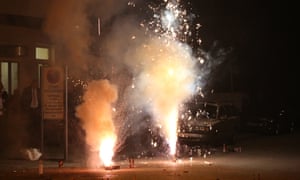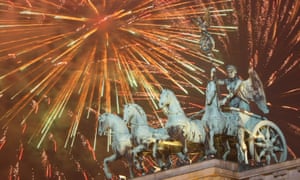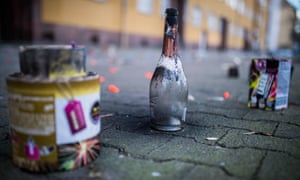Baron van lunt zu sas
Registered User
https://www.theguardian.com/world/2...fun-new-year-firework-displays-divide-germans
'We don't want to spoil the fun' - new year firework displays divide Germans
Silvester celebrations seen as an opportunity for Germans to let off steam, but sharp rise in injuries has prompted calls for a ban

Kate Connolly in Berlin
Thu 27 Dec 2018 13.58 GMTLast modified on Thu 27 Dec 2018 16.15 GMT
Shares
913

Fireworks set off on the streets of Munich in the early hours of 1 January 2018. Photograph: NurPhoto/NurPhoto via Getty Images
When the clock strikes midnight to begin the new year, Germany’s reputation for orderliness is shattered by pyrotechnic displays that explode over every corner of the country.
From balconies and rooftops, in gardens and parks, even in the smallest side streets, private firework displays fill the skies with flashes and bangs until the early hours.
By law, Germans are only allowed to set off fireworks between 6pm on New Year’s Eve and 7am on 1 January. Up to €200m (£180m) is spent on fireworks mainly for personal use, according to Germany’s environment agency.
“It is the only time of the year – for just a few hours – when I feel really free and able to make as much noise as I like, with no one telling me what to do,” says Leonard Schneider, a 21-year-old maintenance technician from Cologne.

FacebookTwitterPinterest
Fireworks explode over the Quadriga sculpture on the Brandenburg gate in celebration of the new year in Berlin. Photograph: Sean Gallup/Getty Images
Launching fireworks at Silvester – as the Germans call New Year’s Eve, after a fourth-century pope – is as important to the national sense of identity as sausages and autobahns. But as emergency services prepare for another night of firework-related personal injuries, calls for a ban are growing.
Last year, two young men died of injuries in two separate incidents linked to fireworks in the state of Brandenburg, and a 14-year-old girl in Thuringia was blinded. In Berlin, five people had to have limbs or parts of limbs amputated, as hand surgeons worked simultaneously in three operating theatres.
Advertisement
Ärzteblatt, the German medical association’s magazine, estimated last year that a single city hospital treated between 50 to 60 serious hand injuries during a New Year’s Eve night, with the most common being serious burns and severed fingers.
“Most injuries are caused by homemade rockets or fireworks bought from unauthorised sources,” it states, pointing out that the inevitable high level of alcohol consumption exacerbates the situation.

Plastic surgeons call for cigarette-style warnings on fireworks
Read more
Tobias Lindner, a consultant accident and emergency doctor at Berlin’s Charité hospital, lists the range of injuries typical for a Silvester night, from acoustic shock – or blast injury to the ear – to eye injuries (often caused by shrapnel), burns and even lost limbs.
“We’ve seen a growing number of injuries of innocent people who have been hit by rockets thrown in their direction,” he says. “A classic scenario is people throwing firecrackers on to the streets from upper storey open windows or rockets that ricochet off buildings and hit people.”
There are twice as many doctors as usual on duty in A&E at Silvester, he says. Plastic surgeons specialising in hand injuries and eye surgeons are among the medics most in demand.

FacebookTwitterPinterest
A bottle used to light rockets stands on a street next to other leftovers from new years celebrations in Berlin last year. Photograph: dpa/Alamy Stock Photo
Schneider insists that, like the majority of Germans, he only buys his “class 2” category rockets – containing up to 10 grams of gunpowder or, if battery-driven, with a maximum explosive mass of 500 grams – from his local supermarket. But increasingly, fireworks with a far higher capacity and known as Polish rockets (Polenböller) are being smuggled in illegally from eastern Europe or Asia. Often rockets are taken apart and the gunpowder mixed together to form more powerful devices.
Last year, during new year celebrations in Berlin – a traditional stronghold for Silvester fireworks – firefighters were called to 444 fires, including at a century-old music hall which was burnt to the ground. The fire brigade even came under vicious attack itself from gangs who pelted them with firecrackers and tried to hold up their vehicles.
Berlin politician Jörg Strodter was part of a group of SPD members who tried to introduce a law change earlier this year to limit the setting off of fireworks, or “böllern” as it’s referred to colloquially, to specifically authorised zones in order to prevent people from launching pyrotechnics wherever they like.
Advertisement
“We don’t want to spoil people’s fun, but these war-like circumstances at Silvester can’t be allowed to continue,” he told parliament.

FacebookTwitterPinterest
A supermarket trolley stacked with fireworks. Photograph: dpa/Alamy Stock Photo
Injuries, the negative impact of fine particles on health, animal welfare, traumatised refugees reminded of the acoustics of war and the debris left behind for days afterwards were among the arguments given in favour of tighter controls.
But the law was not passed due to major differences of opinion over striking a balance between public safety and the freedom to celebrate. Instead, MPs agreed only on a draft agreement appealing to people to reduce their use of fireworks.
Some cities have used fire safety regulations for the protection of old buildings to enable them to successfully introduce firework-free zones. In those cities, displays are only allowed in designated zones on the outskirts.
But there are also plenty who strike a severe note of caution over restricting the Silvester celebrations too much.
“There are legitimate reasons to say we don’t need Silvester – that we’d be better off donating the money spent on fireworks to charity,” says Manuel Trummer, a cultural anthropologist at the University of Regensburg. “But this is an extremely important ritual for the Germans who see it as a small window of opportunity to break the rules they otherwise have to abide by.
“At a time when our society is fragmenting in so many ways, Silvester is one of the few times when a real sense of consensus reigns.”
It also acts as a pressure valve, he insists. “If you try to stop it, I predict it would be seen as hugely patronising and the backlash would be immense. But I also believe that this battle for the future of Silvester will continue to rage for years to come.”
'We don't want to spoil the fun' - new year firework displays divide Germans
Silvester celebrations seen as an opportunity for Germans to let off steam, but sharp rise in injuries has prompted calls for a ban

Kate Connolly in Berlin
Thu 27 Dec 2018 13.58 GMTLast modified on Thu 27 Dec 2018 16.15 GMT
Shares
913

Fireworks set off on the streets of Munich in the early hours of 1 January 2018. Photograph: NurPhoto/NurPhoto via Getty Images
When the clock strikes midnight to begin the new year, Germany’s reputation for orderliness is shattered by pyrotechnic displays that explode over every corner of the country.
From balconies and rooftops, in gardens and parks, even in the smallest side streets, private firework displays fill the skies with flashes and bangs until the early hours.
By law, Germans are only allowed to set off fireworks between 6pm on New Year’s Eve and 7am on 1 January. Up to €200m (£180m) is spent on fireworks mainly for personal use, according to Germany’s environment agency.
“It is the only time of the year – for just a few hours – when I feel really free and able to make as much noise as I like, with no one telling me what to do,” says Leonard Schneider, a 21-year-old maintenance technician from Cologne.

FacebookTwitterPinterest
Fireworks explode over the Quadriga sculpture on the Brandenburg gate in celebration of the new year in Berlin. Photograph: Sean Gallup/Getty Images
Launching fireworks at Silvester – as the Germans call New Year’s Eve, after a fourth-century pope – is as important to the national sense of identity as sausages and autobahns. But as emergency services prepare for another night of firework-related personal injuries, calls for a ban are growing.
Last year, two young men died of injuries in two separate incidents linked to fireworks in the state of Brandenburg, and a 14-year-old girl in Thuringia was blinded. In Berlin, five people had to have limbs or parts of limbs amputated, as hand surgeons worked simultaneously in three operating theatres.
Advertisement
Ärzteblatt, the German medical association’s magazine, estimated last year that a single city hospital treated between 50 to 60 serious hand injuries during a New Year’s Eve night, with the most common being serious burns and severed fingers.
“Most injuries are caused by homemade rockets or fireworks bought from unauthorised sources,” it states, pointing out that the inevitable high level of alcohol consumption exacerbates the situation.

Plastic surgeons call for cigarette-style warnings on fireworks
Read more
Tobias Lindner, a consultant accident and emergency doctor at Berlin’s Charité hospital, lists the range of injuries typical for a Silvester night, from acoustic shock – or blast injury to the ear – to eye injuries (often caused by shrapnel), burns and even lost limbs.
“We’ve seen a growing number of injuries of innocent people who have been hit by rockets thrown in their direction,” he says. “A classic scenario is people throwing firecrackers on to the streets from upper storey open windows or rockets that ricochet off buildings and hit people.”
There are twice as many doctors as usual on duty in A&E at Silvester, he says. Plastic surgeons specialising in hand injuries and eye surgeons are among the medics most in demand.

FacebookTwitterPinterest
A bottle used to light rockets stands on a street next to other leftovers from new years celebrations in Berlin last year. Photograph: dpa/Alamy Stock Photo
Schneider insists that, like the majority of Germans, he only buys his “class 2” category rockets – containing up to 10 grams of gunpowder or, if battery-driven, with a maximum explosive mass of 500 grams – from his local supermarket. But increasingly, fireworks with a far higher capacity and known as Polish rockets (Polenböller) are being smuggled in illegally from eastern Europe or Asia. Often rockets are taken apart and the gunpowder mixed together to form more powerful devices.
Last year, during new year celebrations in Berlin – a traditional stronghold for Silvester fireworks – firefighters were called to 444 fires, including at a century-old music hall which was burnt to the ground. The fire brigade even came under vicious attack itself from gangs who pelted them with firecrackers and tried to hold up their vehicles.
Berlin politician Jörg Strodter was part of a group of SPD members who tried to introduce a law change earlier this year to limit the setting off of fireworks, or “böllern” as it’s referred to colloquially, to specifically authorised zones in order to prevent people from launching pyrotechnics wherever they like.
Advertisement
“We don’t want to spoil people’s fun, but these war-like circumstances at Silvester can’t be allowed to continue,” he told parliament.

FacebookTwitterPinterest
A supermarket trolley stacked with fireworks. Photograph: dpa/Alamy Stock Photo
Injuries, the negative impact of fine particles on health, animal welfare, traumatised refugees reminded of the acoustics of war and the debris left behind for days afterwards were among the arguments given in favour of tighter controls.
But the law was not passed due to major differences of opinion over striking a balance between public safety and the freedom to celebrate. Instead, MPs agreed only on a draft agreement appealing to people to reduce their use of fireworks.
Some cities have used fire safety regulations for the protection of old buildings to enable them to successfully introduce firework-free zones. In those cities, displays are only allowed in designated zones on the outskirts.
But there are also plenty who strike a severe note of caution over restricting the Silvester celebrations too much.
“There are legitimate reasons to say we don’t need Silvester – that we’d be better off donating the money spent on fireworks to charity,” says Manuel Trummer, a cultural anthropologist at the University of Regensburg. “But this is an extremely important ritual for the Germans who see it as a small window of opportunity to break the rules they otherwise have to abide by.
“At a time when our society is fragmenting in so many ways, Silvester is one of the few times when a real sense of consensus reigns.”
It also acts as a pressure valve, he insists. “If you try to stop it, I predict it would be seen as hugely patronising and the backlash would be immense. But I also believe that this battle for the future of Silvester will continue to rage for years to come.”

